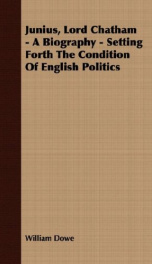junius lord chatham a biography setting forth the condition of english politic

PREFACE, THE historic reader is struck or should be with the facts that Lord Chatham is represented as in some de gree out of his senses full of a certain perversity, secret, evasive, scowling, and implacable during a portion of his career and that the period of his strange, unexplained lunacy was the very period of the Junian epistles. In the earlier part of the lustrum, 1767-1772, the great baffled minister was doing something under a cloud, and behind a curtain and Junius, at the same time, in all his forti tudes, girding at the king, lords, and commons of England. A remarkable coincidence but not sufficiently remarked, we suspect, by those who meditate that Epistolary Sphinx of the last age. The same reader has, probably, felt surprise that the orator, whose genius and audacity could raise the monoton ous character of British eloquence to the old Greek level of the Agora and the statesman, who, since the stronger times of the Wolseys and Burleighs, stands up alone to redeem the common run and fatal mediocrity of British statesmanship, should have such an indistinct and meagre
Info about the book
Author:
Series:
Unknown
ISBN:
1103799258
Rating:
4/5 (3)Your rating:
0/5
Languge:
English
Users who have this book
Users who want this book
What readers are saying
What do you think? Write your own comment on this book!
write a commentif you like junius lord chatham a biography setting forth the condition of english politic try:
Other books by this author
Do you want to exchange books? It’s EASY!
Get registered and find other users who want to give their favourite books to good hands!

